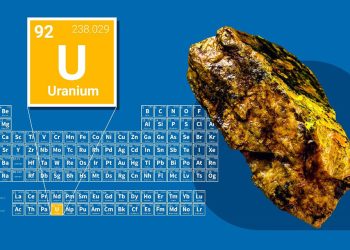
Namibia’s Mines ministry has urged Namibia’s mining industry to embrace sustainable practices, emphasising the importance of responsible mining with a long-term perspective.
Minister of Mines and Energy Tom Alweendo called on mining industry players to move away from short-term strategies focused on immediate gains.
He advocates for approaches that ensure the long-term sustainability of the sector and consider the needs of future generations.
“In addition, responsible mining necessitates a long-term perspective that considers the needs of future generations. Therefore, industry players must move away from short-sighted approaches that prioritise immediate gains at the expense of long-term sustainability of our industry,” Alweendo said at the launch of the Rössing Uranium Sustainability and Performance Report recently.
The Minister noted that responsible mining is crucial for a sustainable future and requires collaboration among governments, industry, civil society and local communities.
The Mines Ministry believes that, together, these groups can create a mining paradigm that respects the planet, empowers communities and sustains shared prosperity.
Alweendo commended Rössing Uranium and its shareholder, China National Nuclear Corporation, for their dedication and innovation, which have led to substantial financial achievements.
He highlighted the mine’s enhancement of safety standards, evidenced by its recent win at the 2023 Inter-mine Safety Competition held by the Chamber of Mines of Namibia.
“I implore all the mining industry players to adopt a safety-first approach overproduction,” Alweendo urged.
He also praised the mine’s leadership for securing approval for Phase 4 mine expansion, extending the life of the mine to 2036 from the previously forecasted 2026.
Alweendo noted that the mine’s good production year was due to favourable macroeconomic factors contributing to its financial performance in 2023.
“In an industry as dynamic and challenging as mining, and in particular, the uranium subsector, financial performance is not just a reflection of numbers on a balance sheet. It is a testament to the ingenuity and determination of those involved,” Alweendo remarked.
Alweendo emphasised that Rössing Uranium’s success is part of the broader mining industry’s significant contribution to the Namibian economy.
This comes as the mining sector’s contribution to GDP rose to 14.4% in 2023 from 11.9% in 2022.
Similarly, local procurement by the industry exceeded N$21 billion, and contributions to the fiscus in royalties and taxes reached at least N$6.4 billion, up from N$4.2 billion in 2022.
The sector’s direct employment stands at approximately 18,189, with total expenditure on corporate social responsibility (CSR) reaching N$211 million.
“These statistics indicate that the mining industry remains the bedrock of our economy. Therefore, our ministry remains optimistic about the trajectory of Namibia’s mining industry. Hence, I would like to commend all mining industry stakeholders for their positive contribution to the Namibian economy during 2023,” Alweendo said.
The Minister pointed out the positive implications of the renewed interest in nuclear energy, noting that uranium prices have surpassed the US$100 per pound mark.
Coupled with the emerging green hydrogen industry, Alweendo expressed confidence in Namibia’s potential to become a regional powerhouse.
“As the Ministry of Mines and Energy, it is our mandate to ensure that our mineral resources are mined responsibly. Responsible mining is not merely a desirable option, it is an imperative,” he said.







